Bolivia’s upcoming judicial elections, mired in controversy and public disinterest, serve as a precursor for Mexico, which is adopting a similar system. The process has been criticized for transforming judges into political pawns, undermining judicial independence. Meanwhile, an ongoing power struggle between Bolivian leaders portrays a precarious future for the judiciary. As both nations grapple with the implications of judicial elections, the lessons learned from Bolivia may be crucial for informing Mexico’s transition.
In Bolivia, where campaigning for judicial elections is officially prohibited, candidates have resorted to creative methods to increase their visibility among voters. For instance, some candidates’ faces appeared on snack packages, and subtle messaging was incorporated into official voting materials. The unique system of electing judges is now facing scrutiny, with the forthcoming elections set to serve as a bellwether for Mexico, which is poised to adopt a similar process following a significant reform championed by President Andrés Manuel López Obrador.
Bolivia’s current president, Luis Arce, emphasized the importance of these elections as pivotal for democracy during his voting day remarks. However, the electorate’s level of apathy is apparent, as many voters express uncertainty regarding their choices. During this mandatory voting exercise, long queues and confusion over candidates have led to disillusionment among the populace, with individuals resorting to random decision-making due to a lack of knowledge about judicial candidates.
The historical context reveals that Bolivia’s system replaced a more traditional method of judicial nominations, which prioritized qualifications. Critics argue that such an electoral approach erodes judicial autonomy, consolidating partisan control over the courts. Despite some officials defending the electoral process, public sentiment largely reflects dissatisfaction with the current mechanism. Judicial elections have occurred twice before under former President Evo Morales, yet both instances resulted in overwhelmingly null votes as citizens rejected the concept of endorsing largely unknown candidates.
A recent delay in the elections underscores the ongoing power struggle between President Arce and ex-President Morales, indicating underlying tensions within the ruling party. While the elections were intended to be conclusive, only a fraction of the judicial seats are contested, prompting further skepticism about the legitimacy and efficacy of the judicial election process. The current situation for Bolivia’s judiciary illustrates a cautionary tale for Mexico and highlights vital considerations for the integrity of democratic institutions.
Bolivia stands as a unique case globally, being the only nation that holds elections for senior judicial positions. The electoral process was significantly altered in 2009 under President Evo Morales, who aimed to mitigate corruption within the judiciary and strengthen democratic processes. However, the public has grown increasingly wary of this system, viewing the elections as a means for political manipulation rather than genuine reform. Bolivian voters now contend with a climate of mistrust and dissatisfaction, which parallels the challenges expected in Mexico’s similar judicial reform. Former President López Obrador’s controversial overhaul of Mexico’s justice system is anticipated to mirror Bolivia’s judicial election mechanics, prompting scrutiny from political commentators and activists alike. The overarching concern is how these reforms may influence judiciary independence across Latin America, with many experts expressing paradoxical views on politicized elections invariably undermining democratic foundations. Existing discontent manifests a broader trend observed throughout Latin America, where public trust in the judiciary remains fragile. With Bolivia scheduled for its third round of judicial elections, insights derived from the outcome may significantly impact the forthcoming judicial structure in Mexico, as both nations grapple with the complexities of judicial accountability and political interference.
The unfolding events surrounding Bolivia’s judicial elections present essential lessons for Mexico as it embarks on a similar path. With rising public discontent regarding the efficacy and legitimacy of judicial elections, both countries must confront the delicate balance between judicial independence and political influence. The outcomes of Bolivia’s election may serve as a critical indicator for Mexico’s judicial future, highlighting the importance of transparency and public engagement in fostering a dependable judicial system. As histories intertwine, stakeholders are left to reconsider the implications of electing judges on democracy and governance within their respective contexts.
Original Source: www.newspressnow.com




